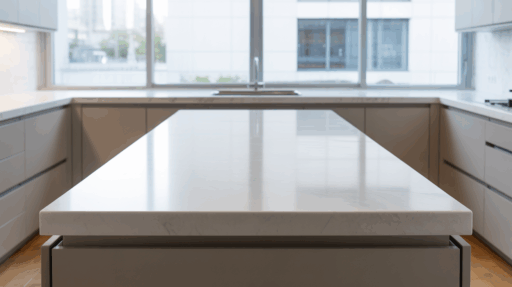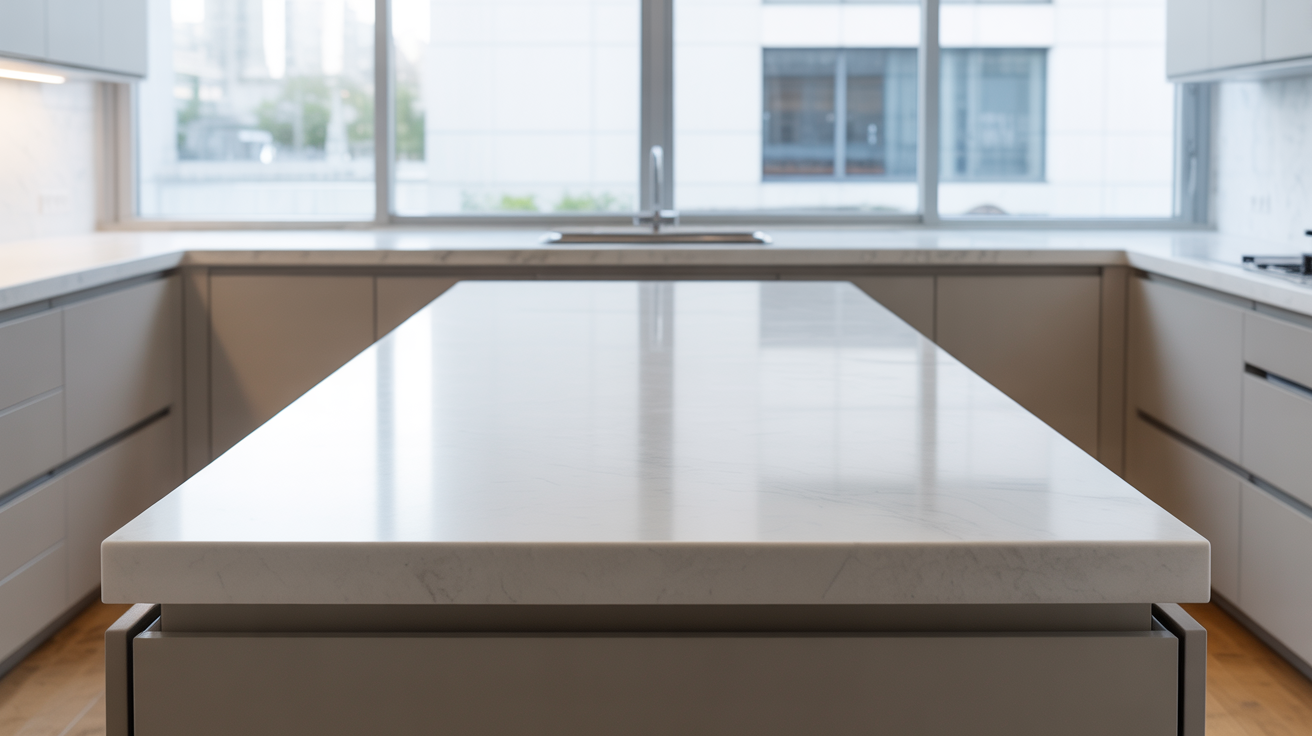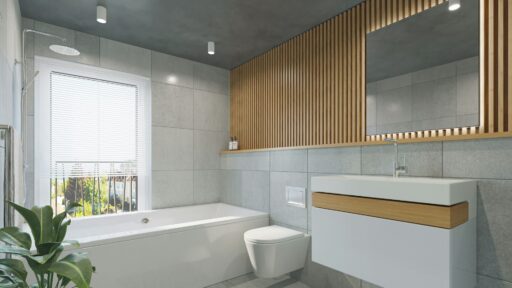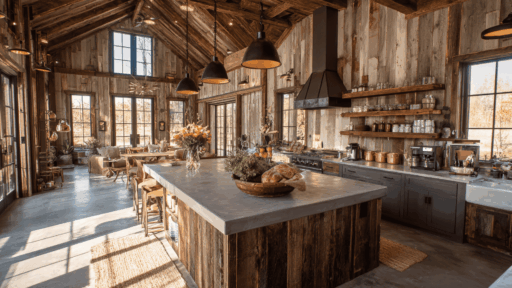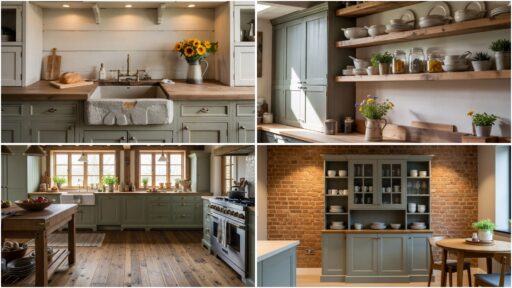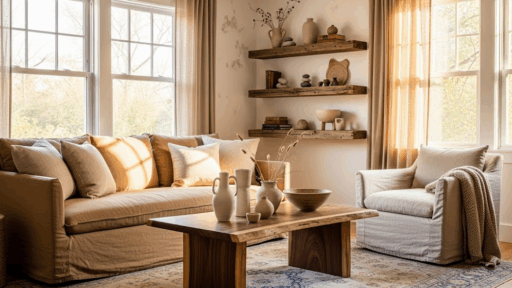Choosing the right countertop can make or break your kitchen’s look and functionality.
I’ve been there, standing in showrooms, overwhelmed by endless options and conflicting advice. That’s why I’ve put together this comprehensive blog, covering different types of countertops you can consider for your space.
From budget-friendly laminates to luxurious natural stones, each material has its personality. Some are maintenance queens, others are practically indestructible. The “best” choice depends entirely on how you use your kitchen.
Let’s get into the world of countertops and find your perfect match.
Key Factors to Consider When Choosing a Countertop
Before falling in love with any countertop material, you need to honestly assess how you use your kitchen and what you’re willing to maintain.
The right choice balances your lifestyle needs, design preferences, and budget while considering factors like durability, heat resistance, and long-term value.
| Factor | What to Consider | What to Look For |
| Durability | How well the material resists wear and how often it needs upkeep | Non-porous surfaces, sealed stone, scratch resistance |
| Heat & Stain Resistance | Resistance to hot pans, spills, and daily prep damage | Heat-rated stone, stain-proof sealants, scratch-resistant finishes |
| Aesthetic & Texture | Visual impact and tactile finish | Color, veining, surface sheen (polished, honed, leathered) |
| Cost & Value | Balance between the upfront price and how long it lasts | Price per sq. ft., expected longevity, warranty |
| Installation | Ease, cost, and structural needs for installation | Material weight, required tools, and the need for a professional installer |
| Eco-Friendliness | Environmental impact and renewable or recycled material use | FSC-certified wood, recycled glass, LEED-compliant or GREENGUARD materials |
| Style Compatibility | How well does the material suit your kitchen’s design theme | Surface pattern, color, edge profile, and material origin |
Different Types of Countertops for Kitchens
Kitchen countertops define your space more than almost any other design choice, but with dozens of materials available, the decision can feel overwhelming.
Understanding the countertop types helps you make a choice that perfectly matches your cooking style, budget, and aesthetic vision.
1. Granite
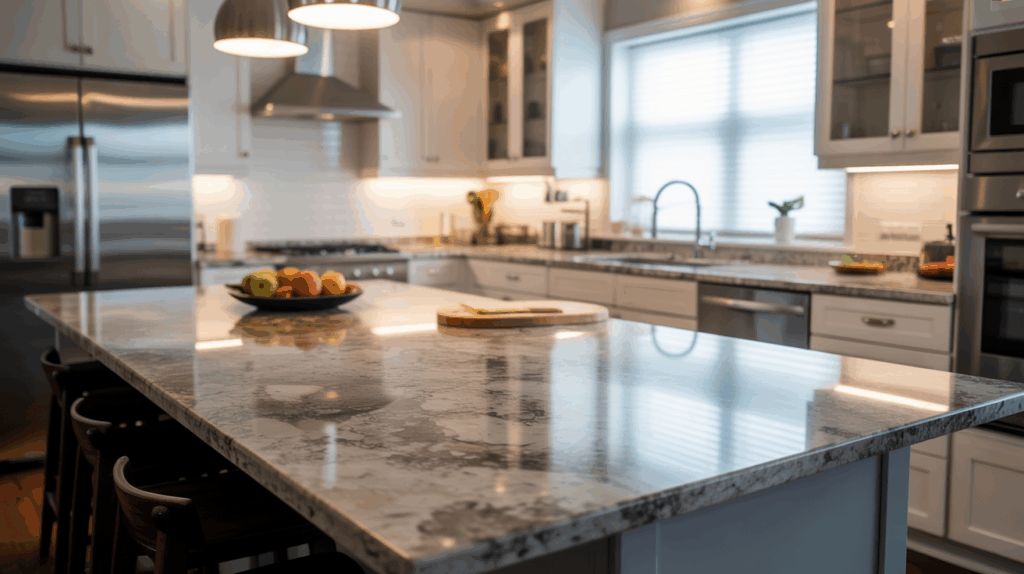
Granite is a natural stone known for its rich, speckled appearance and excellent durability. It comes in a wide range of colors and patterns, making each slab unique and ideal for high-end kitchens.
- Ideal for: Luxury kitchens, frequent cooking areas
- Pros: Heat-resistant, scratch-resistant, visually striking
- Cons: Requires periodic sealing, can be expensive
- Price: $40–$100 per sq. ft.
2. Marble
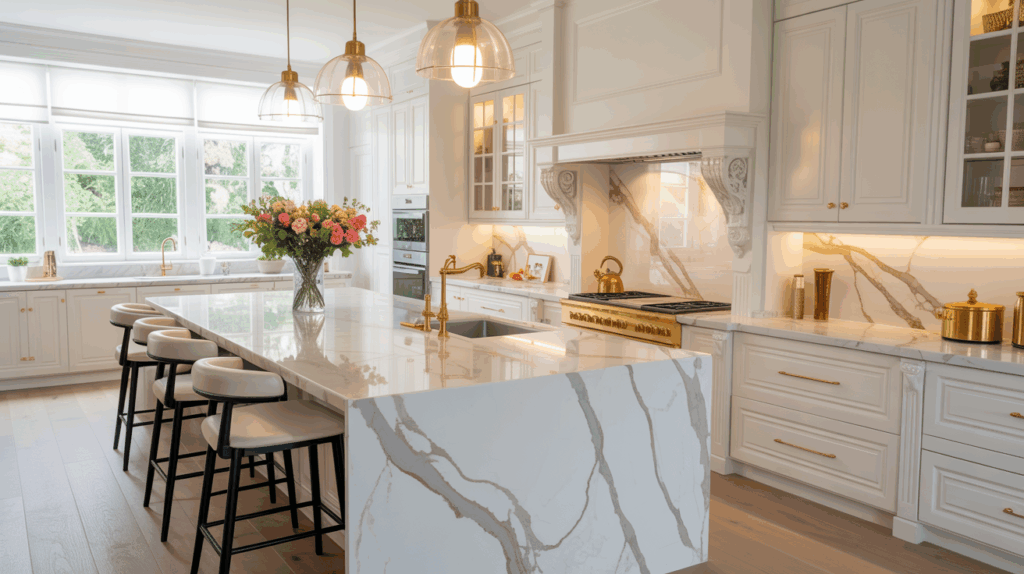
Marble exudes elegance with its soft, veined texture and timeless white and grey tones. While luxurious, it’s more porous than other stones and can stain or etch if not properly maintained.
- Ideal for: Baking stations, classic or upscale kitchens
- Pros: Beautiful, unique veining, cool surface for pastry work
- Cons: Easily stains, prone to scratches, high maintenance
- Price: $50–$150 per sq. ft.
3. Soapstone
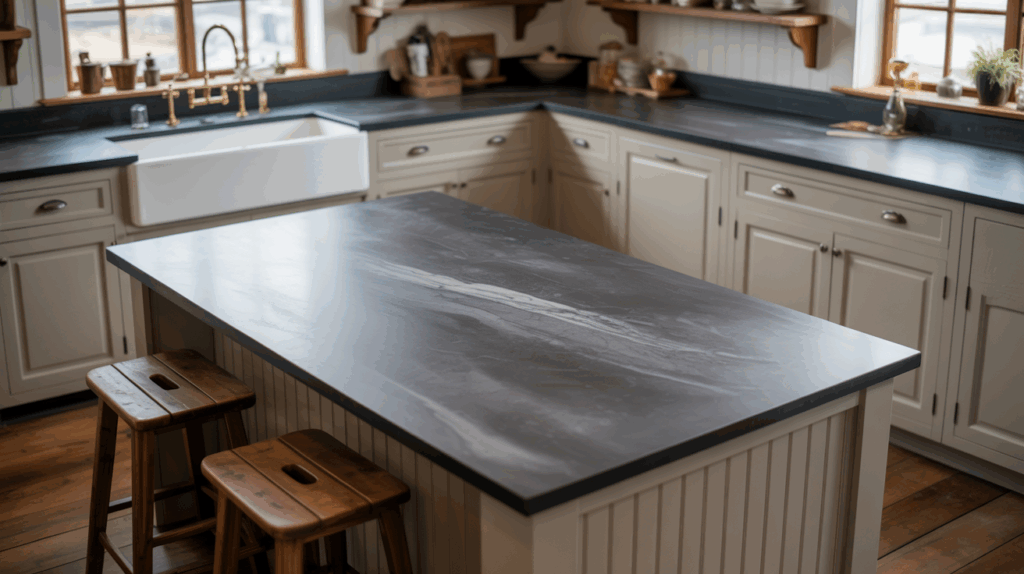
Soapstone is a smooth, matte-finish natural stone that darkens with age. It’s non-porous and resistant to stains and bacteria, making it a functional and distinctive surface.
- Ideal for: Farmhouse or vintage-style kitchens
- Pros: Doesn’t stain, no sealing needed, ages beautifully
- Cons: Can scratch or chip easily, fewer color choices
- Price: $70–$120 per sq. ft.
4. Slate
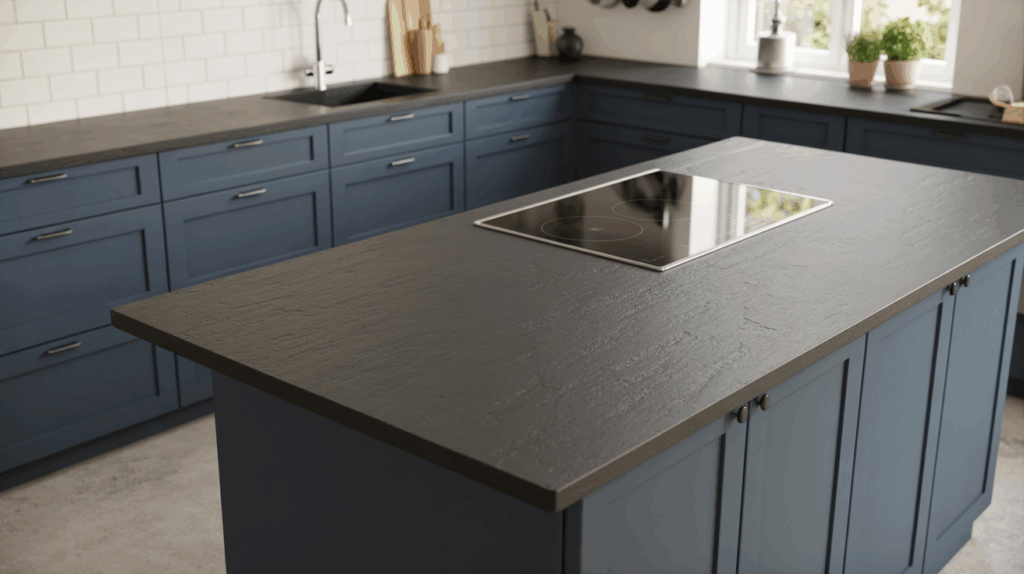
Slate offers a textured, matte finish and a deep, earthy color palette. It’s a lesser-used but stylish natural stone with good durability and minimal maintenance needs.
- Ideal for: Rustic or contemporary kitchens
- Pros: Stain-resistant, low maintenance, subtle texture
- Cons: Limited color options, corners can be brittle
- Price: $50–$100 per sq. ft.
5. Quartzite
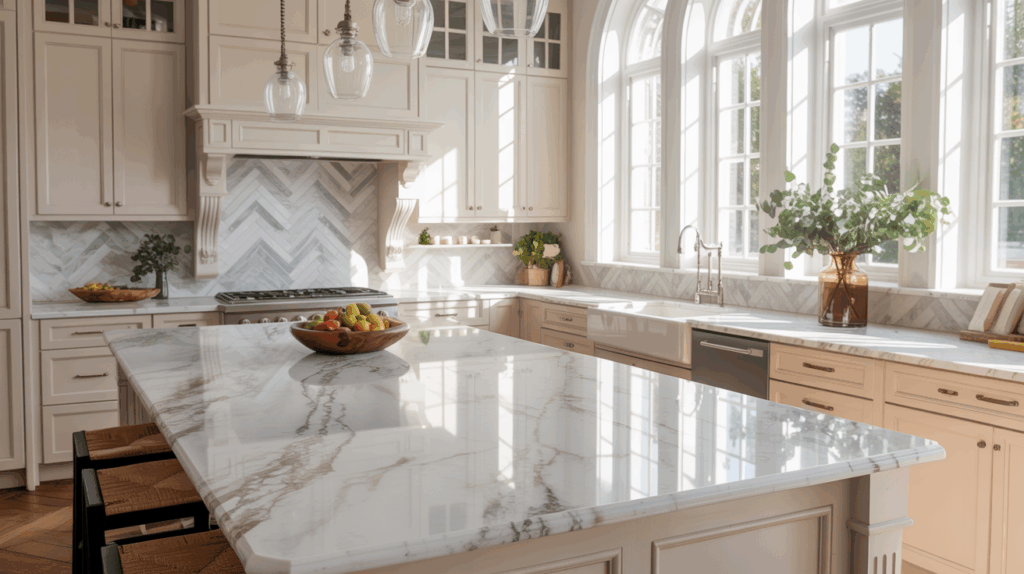
Quartzite is a natural stone that looks like marble but performs more like granite. It offers a luminous, crystalline appearance with high heat and scratch resistance.
- Ideal for: Elegant kitchens needing durability
- Pros: Harder than granite, heat and scratch resistant
- Cons: Can be costly, needs sealing, and has limited availability
- Price: $70–$150 per sq. ft.
6. Custom Hybrid Composites
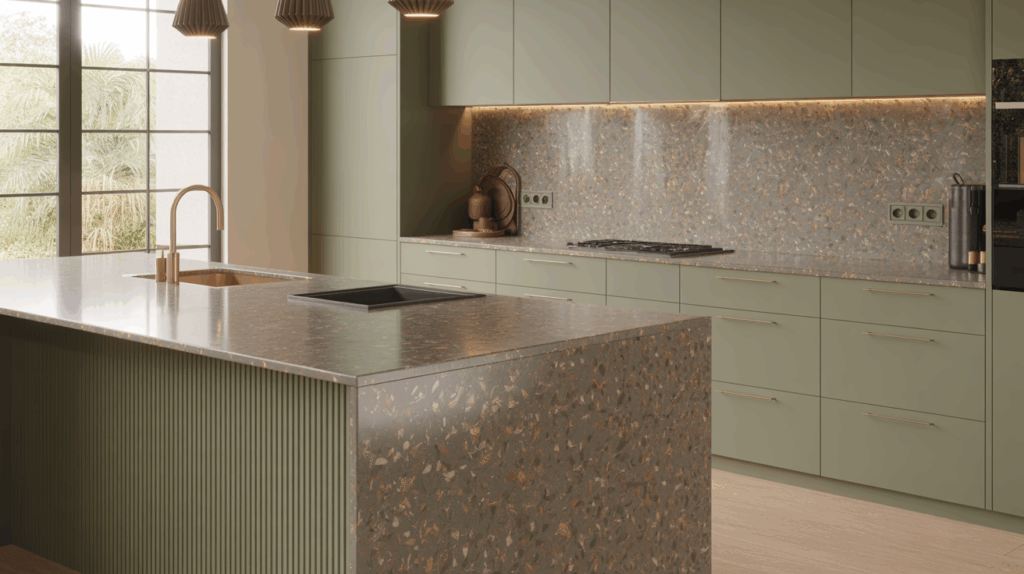
These countertops blend materials like stone dust, resins, recycled content, or metals into a durable and often sustainable surface.
They can be tailored in appearance, thickness, and texture.
- Ideal for: Bespoke kitchens, eco-conscious design projects
- Pros: Customizable, eco-friendly, versatile textures and colors
- Cons: Varies in durability, limited brand options, premium pricing
- Price: $60–$120 per sq. ft.
7. Recycled Glass
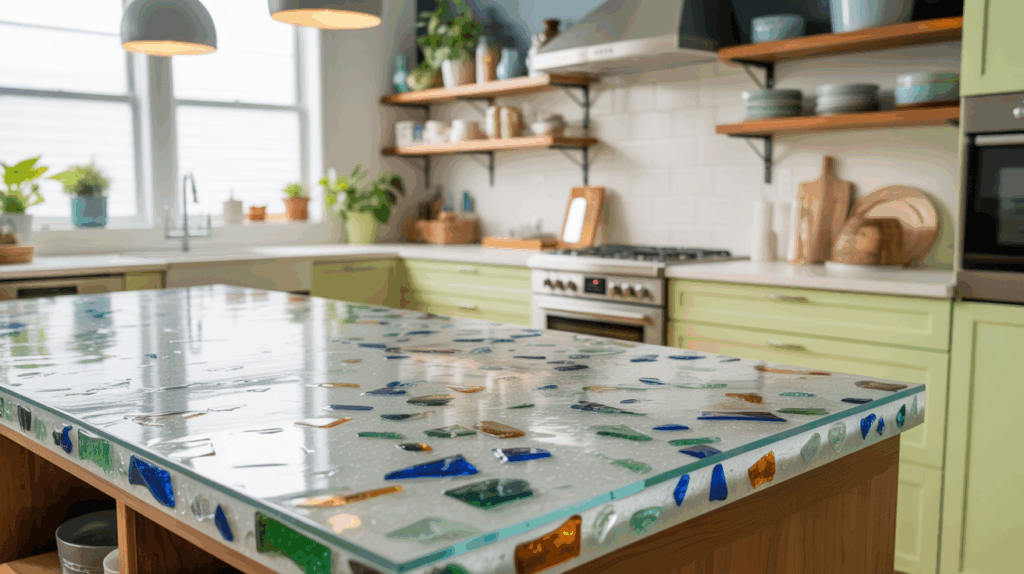
Made from crushed recycled glass embedded in resin or concrete, this countertop offers an eco-friendly and colorful design. Each slab is unique and visually dynamic.
- Ideal for: Eco-conscious or artistic kitchens
- Pros: Sustainable, eye-catching, durable
- Cons: Can chip around edges, needs careful installation
- Price: $60–$110 per sq. ft.
8. Solid Surface (e.g., Corian)
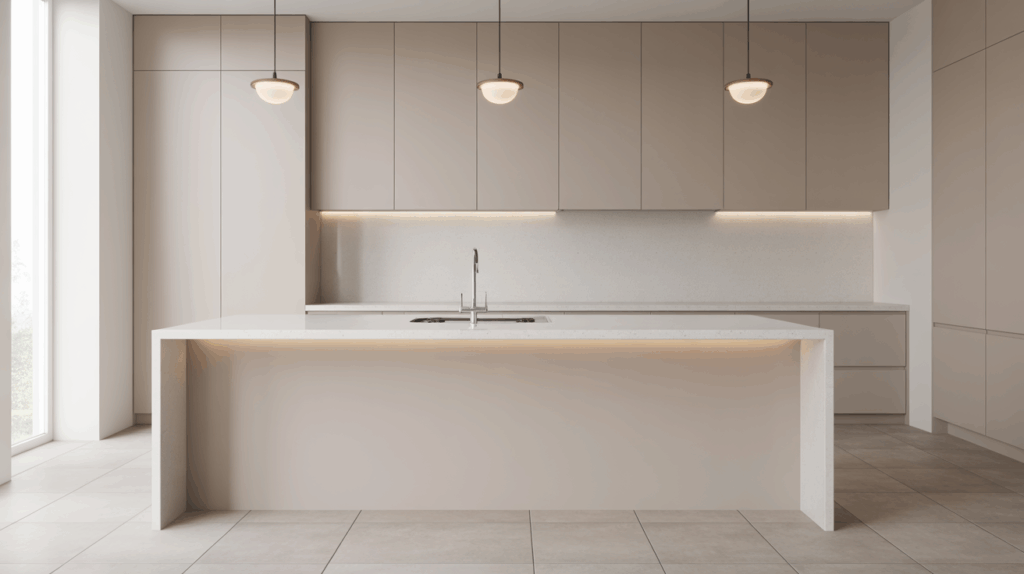
Solid surface countertops are synthetic, non-porous materials available in countless colors and styles. They’re seamless and can be easily repaired if scratched or damaged.
- Ideal for: Modern, minimalist kitchens
- Pros: Seamless look, easy to clean, repairable
- Cons: Can scratch or melt under high heat, not natural
- Price: $45–$80 per sq. ft.
9. Porcelain Slab
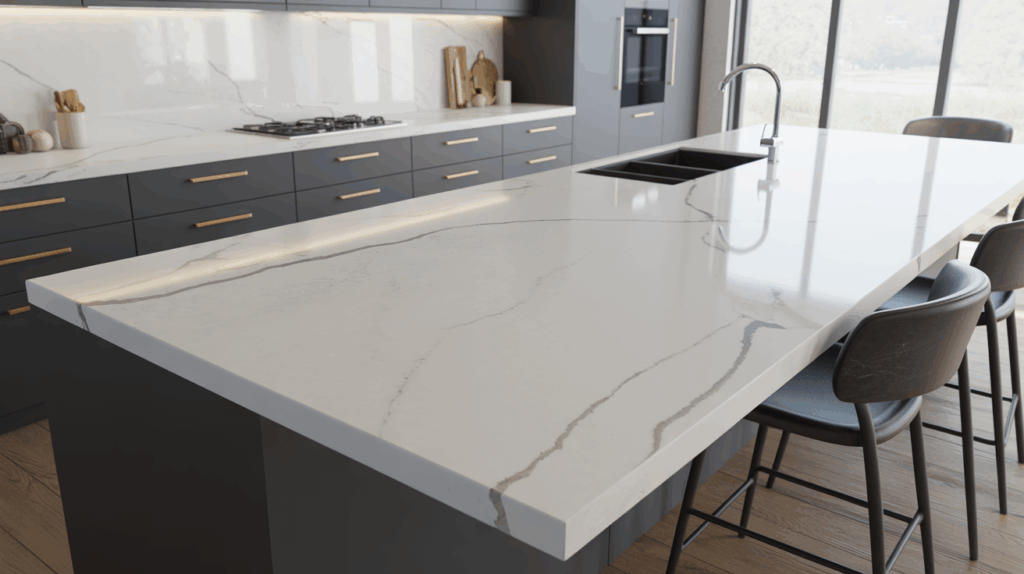
Porcelain slabs are dense, heat-resistant surfaces often made to resemble stone, wood, or concrete. They are non-porous, UV-resistant, and excellent for indoor-outdoor continuity.
- Ideal for: Sleek, high-performance kitchens
- Pros: UV, heat, and stain-resistant, thin yet strong
- Cons: Expensive, limited edge profiles, brittle corners
- Price: $60–$120 per sq. ft.
10. Sintered Stone (e.g., Dekton)
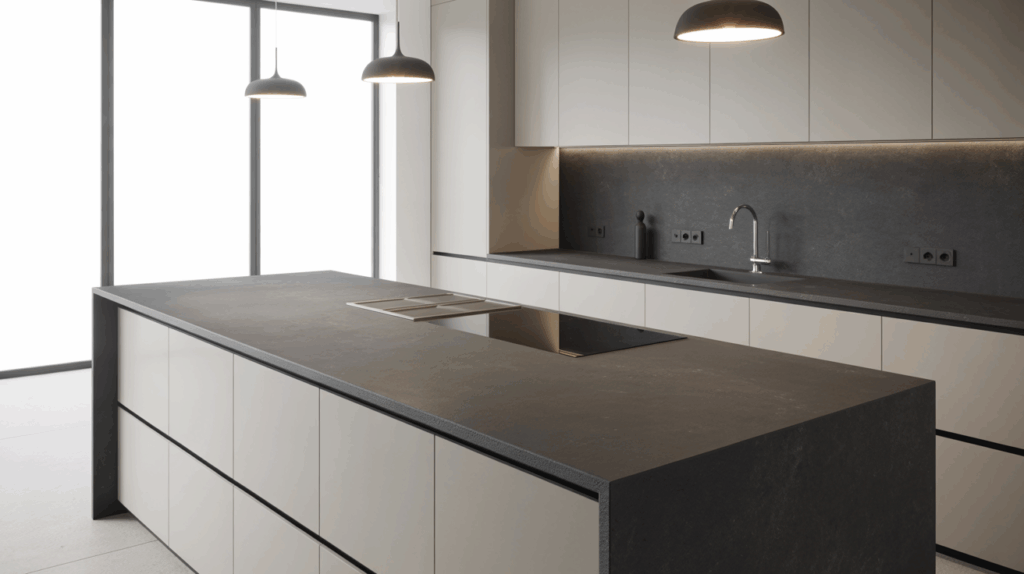
Sintered stone is manufactured using extreme heat and pressure, mimicking natural processes. It’s ultra-durable, UV- and scratch-resistant, and virtually maintenance-free.
- Ideal for: High-traffic or outdoor kitchens
- Pros: Extremely durable, heat- and UV-resistant, non-porous
- Cons: Limited design warmth, hard to repair if cracked
- Price: $80–$160 per sq. ft.
11. Butcher Block
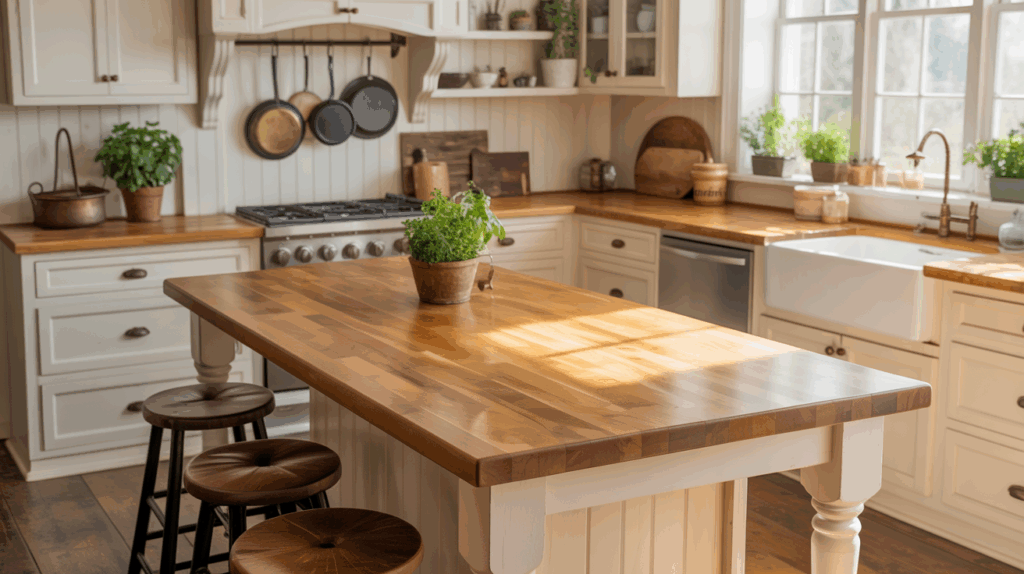
Butcher block countertops are made from strips of hardwood such as maple or oak, glued together to create a warm, natural look. They bring a cozy, farmhouse feel and double as a cutting surface.
- Ideal for: Rustic, cottage, or farmhouse kitchens
- Pros: Warm aesthetic, sandable surface, renewable
- Cons: Prone to scratches and water damage, needs sealing
- Price: $35–$85 per sq. ft.
12. Reclaimed Wood
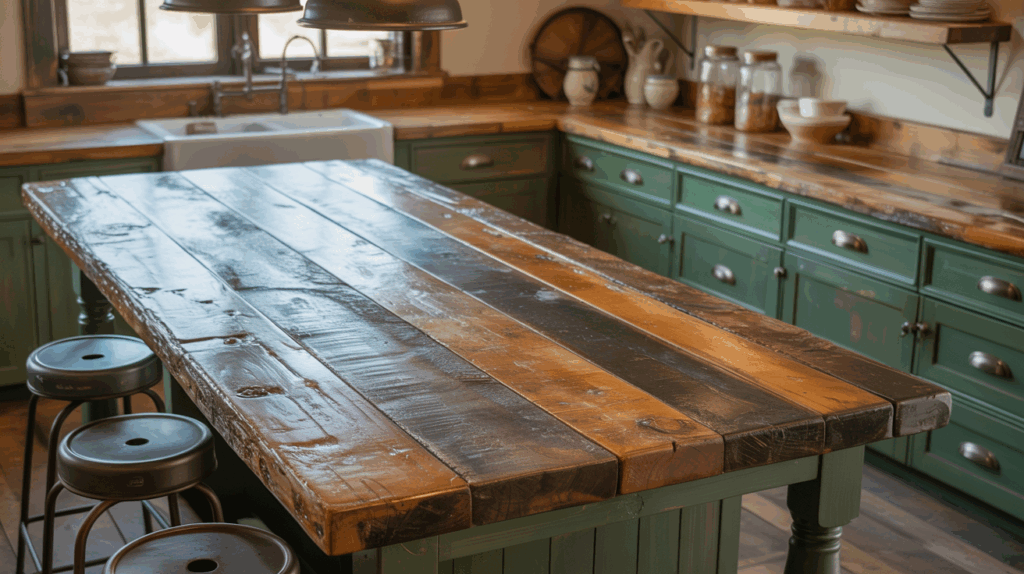
Reclaimed wood countertops use salvaged timber from old buildings or barns, offering a rustic, eco-friendly charm.
Each piece has unique grain patterns, knots, and character marks.
- Ideal for: Sustainable, industrial, or vintage-style kitchens
- Pros: Eco-conscious, full of character, warm feel
- Cons: Can harbor bacteria, high maintenance, inconsistent surface
- Price: $50–$100 per sq. ft.
13. Bamboo
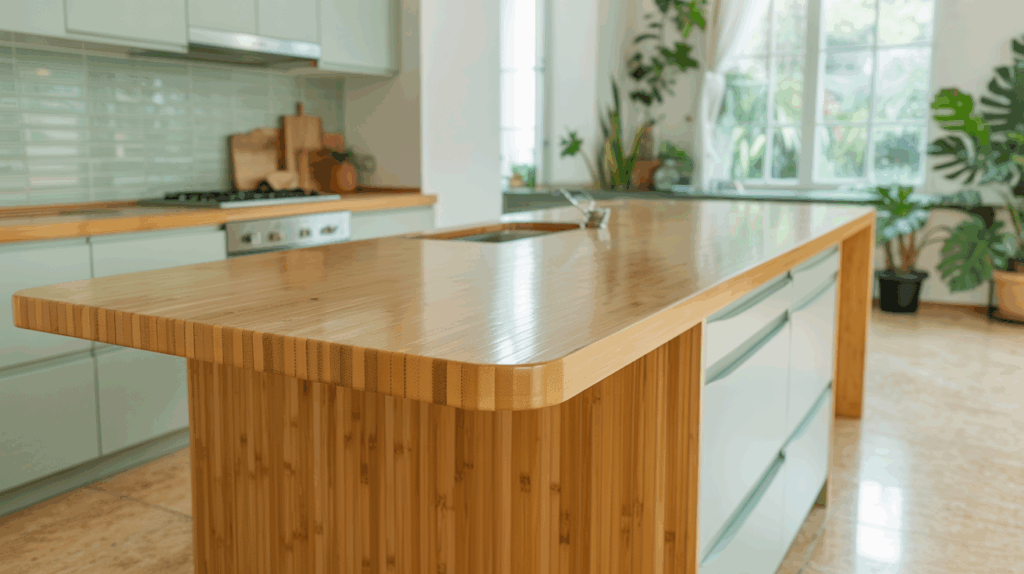
Bamboo countertops are made from pressed bamboo stalks and are considered a renewable, sustainable alternative to wood. They offer a smooth, clean, and light-toned look.
- Ideal for: Eco-friendly and modern spaces
- Pros: Renewable resource, lightweight, antimicrobial properties
- Cons: Susceptible to scratches and heat, needs sealing
- Price: $40–$80 per sq. ft.
14. Stainless Steel
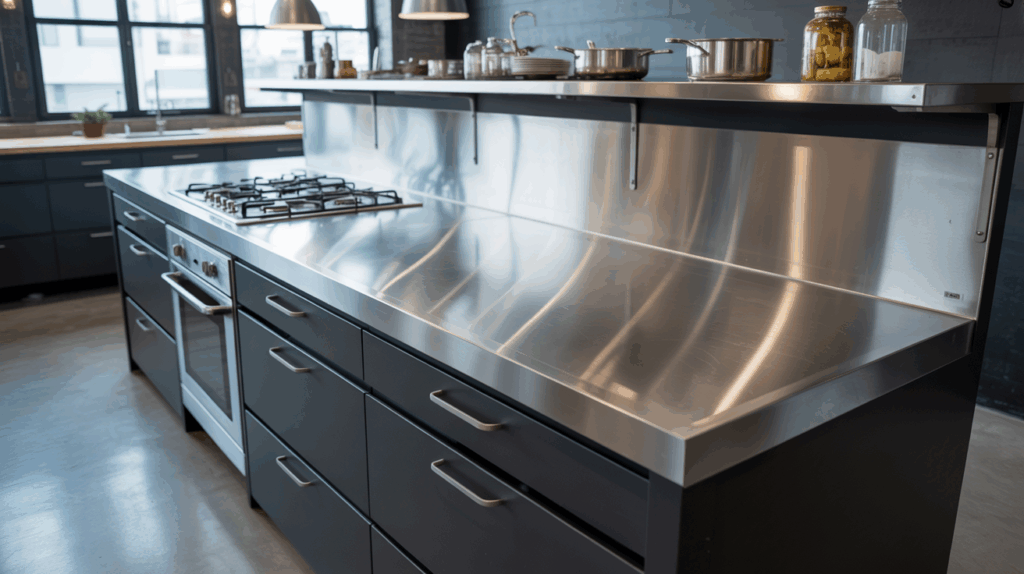
Stainless steel is sleek, professional, and hygienic. Popular in commercial kitchens, it resists bacteria, stains, and heat but can show fingerprints and scratches easily.
- Ideal for: Industrial or chef-inspired kitchens
- Pros: Heat- and stain-resistant, easy to sanitize
- Cons: Can dent or scratch, noisy, shows smudges
- Price: $70–$150 per sq. ft.
15. Copper
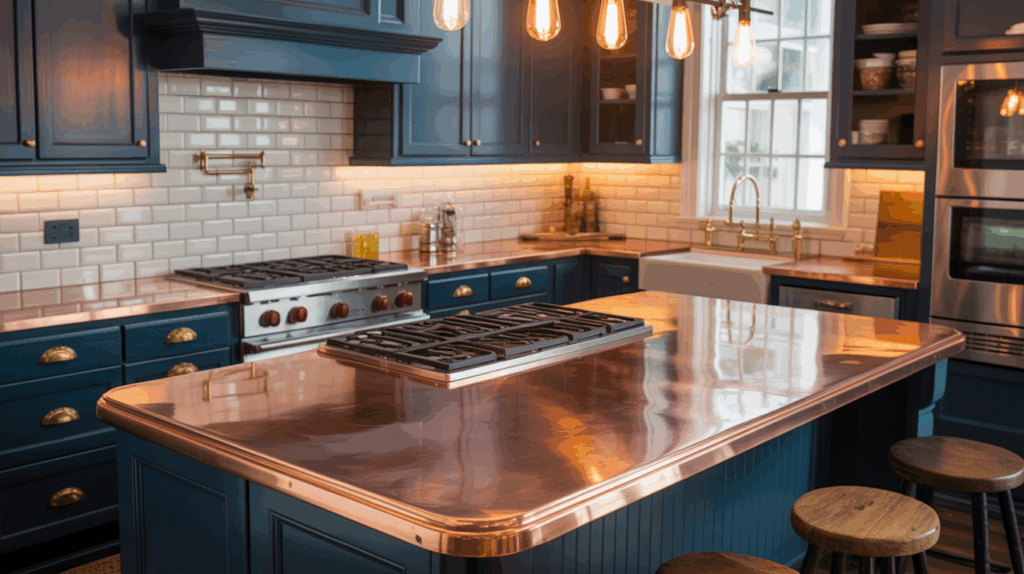
Copper countertops bring warmth and a striking visual impact with a living surface that naturally develops a patina over time. It has antimicrobial properties and is easy to clean.
- Ideal for: Artistic, eclectic, or rustic kitchens
- Pros: Unique appearance, kills bacteria, ages beautifully
- Cons: Scratches easily, reacts to acidic foods, and is expensive
- Price: $90–$175 per sq. ft.
16. Zinc
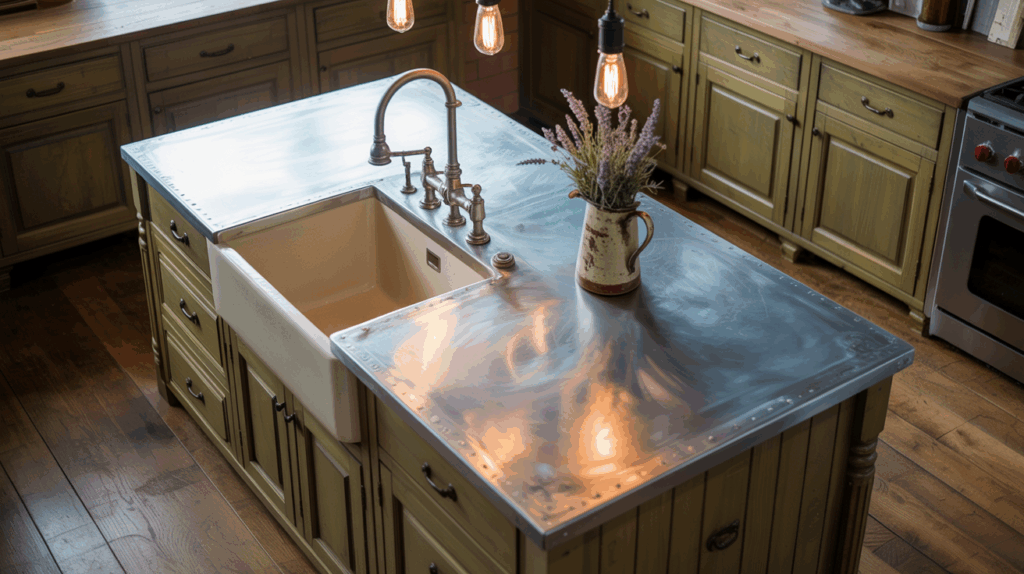
Zinc has a silvery-gray tone that develops a soft blue-gray patina over time. Like copper, it offers a living surface that evolves, giving kitchens a unique, aged character.
- Ideal for: Vintage, industrial, or French farmhouse kitchens
- Pros: Naturally antibacterial, patinas over time
- Cons: Soft, prone to scratches and dents, premium price
- Price: $100–$200 per sq. ft.
17. Aluminum
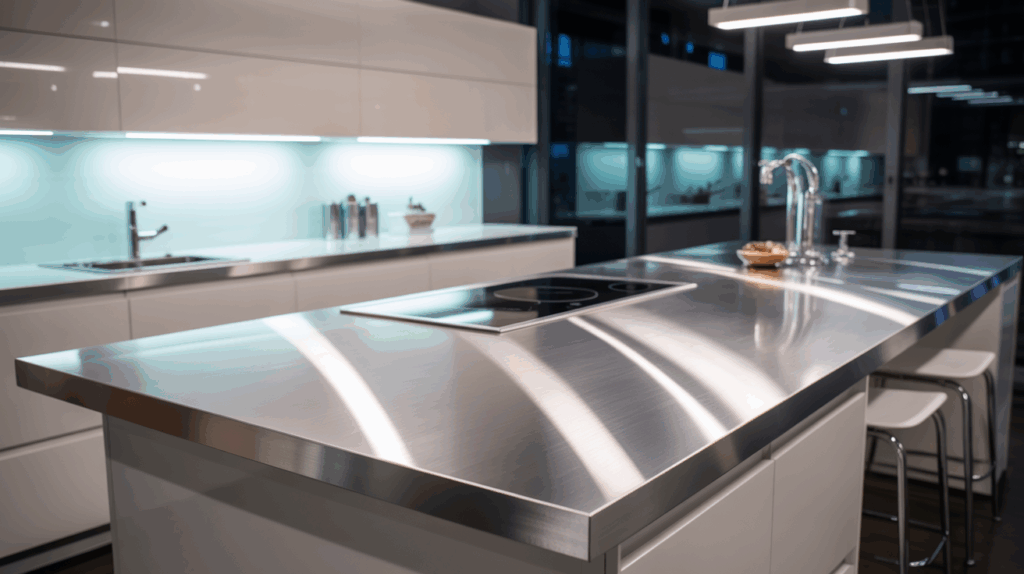
Aluminum countertops are lightweight and corrosion-resistant, offering a shiny, modern alternative to other metals. They’re less common but ideal for contemporary or experimental designs.
- Ideal for: Sleek, modern, or high-tech kitchens
- Pros: Rust-proof, lightweight, clean aesthetic
- Cons: Scratches and dents easily, limited availability
- Price: $70–$130 per sq. ft.
18. Galvanized Steel
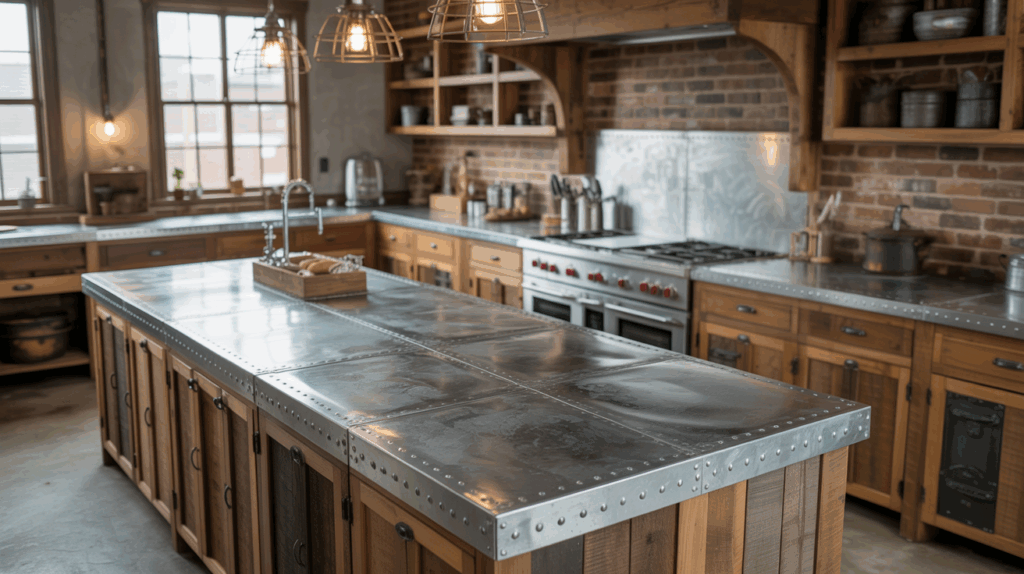
Galvanized steel countertops feature a rugged, industrial finish with a protective zinc coating. They have a gritty aesthetic and are popular in loft-style or workshop-themed kitchens.
- Ideal for: Industrial or utility-style kitchens
- Pros: Tough, rust-resistant, unique style
- Cons: Can discolor, not food-safe without a sealant, harder to clean
- Price: $60–$120 per sq. ft.
19. Concrete
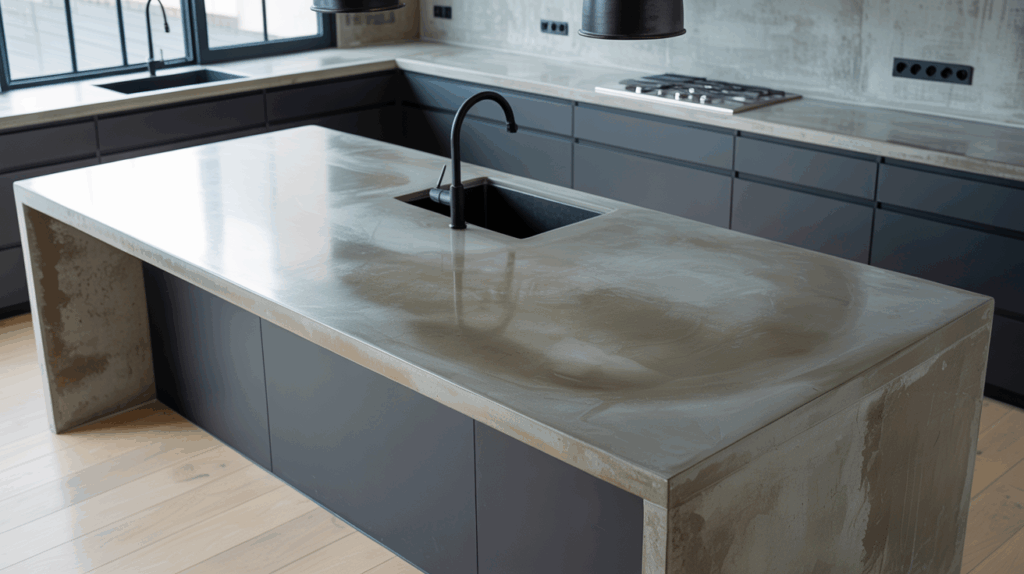
Concrete countertops are custom-made and offer a modern, edgy feel with endless design possibilities. They can be tinted, textured, or inlaid with other materials for a personalized finish.
- Ideal for: Contemporary, industrial, or custom kitchens
- Pros: Fully customizable, heat-resistant, bold aesthetic
- Cons: Heavy, can crack, requires sealing and maintenance
- Price: $65–$135 per sq. ft.
20. Terrazzo
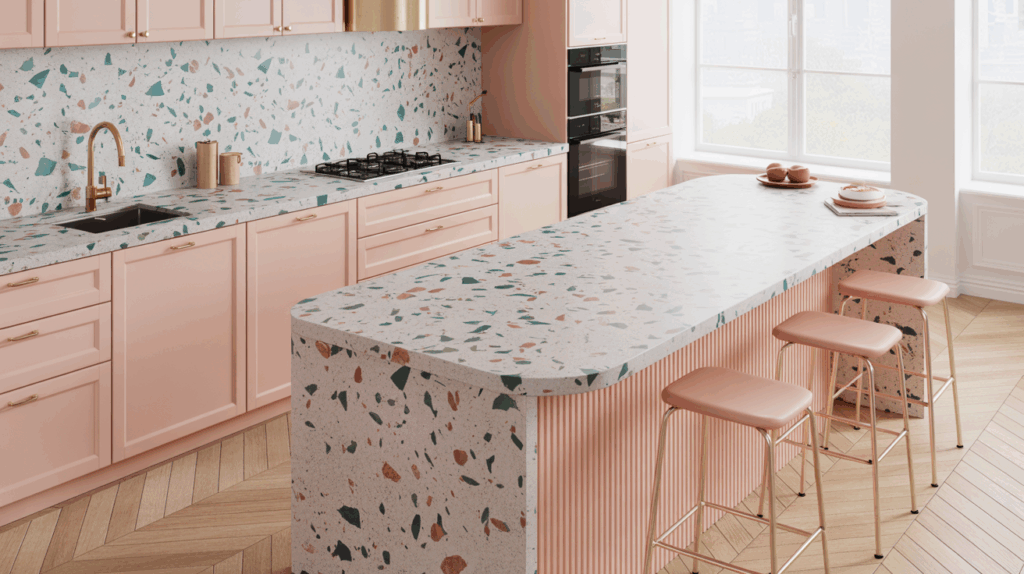
Terrazzo combines marble, quartz, granite, or glass chips set in concrete or resin. It’s colorful, retro, and durable, with a polished finish that creates visual interest.
- Ideal for: Modern, artistic, or mid-century-inspired kitchens
- Pros: Durable, stain-resistant, design flexibility
- Cons: Expensive, may crack over time, needs sealing
- Price: $75–$150 per sq. ft.
21. Laminate
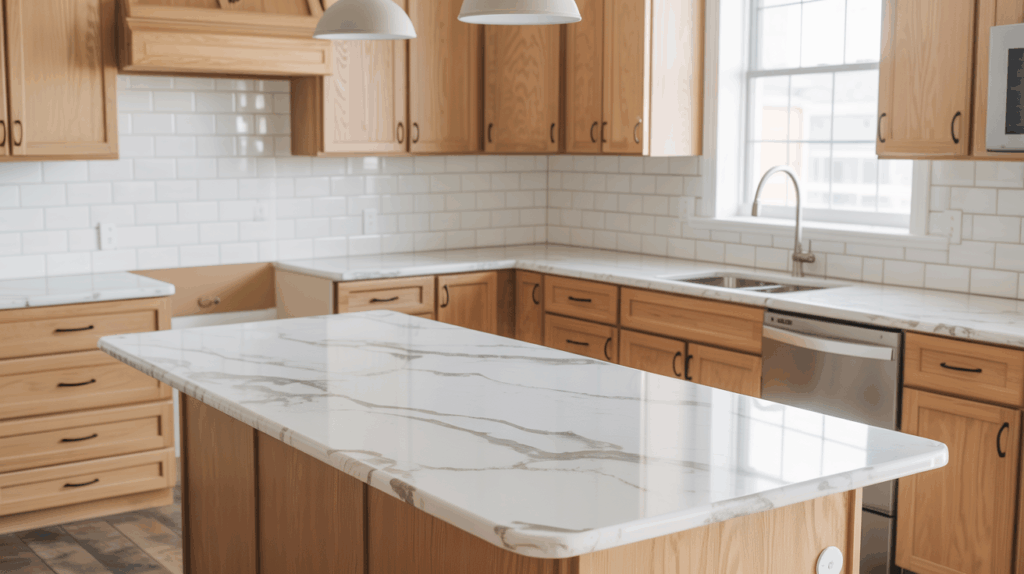
Laminate countertops are made by layering plastic over particleboard, offering a budget-friendly option with limitless color and pattern choices.
They’re lightweight and easy to install, perfect for quick kitchen upgrades or rentals.
- Ideal for: Budget kitchens, rentals, DIY remodels
- Pros: Affordable, wide design variety, easy installation
- Cons: Prone to scratches, burns, and delamination over time
- Price: $20–$50 per sq. ft.
22. Ceramic Tile
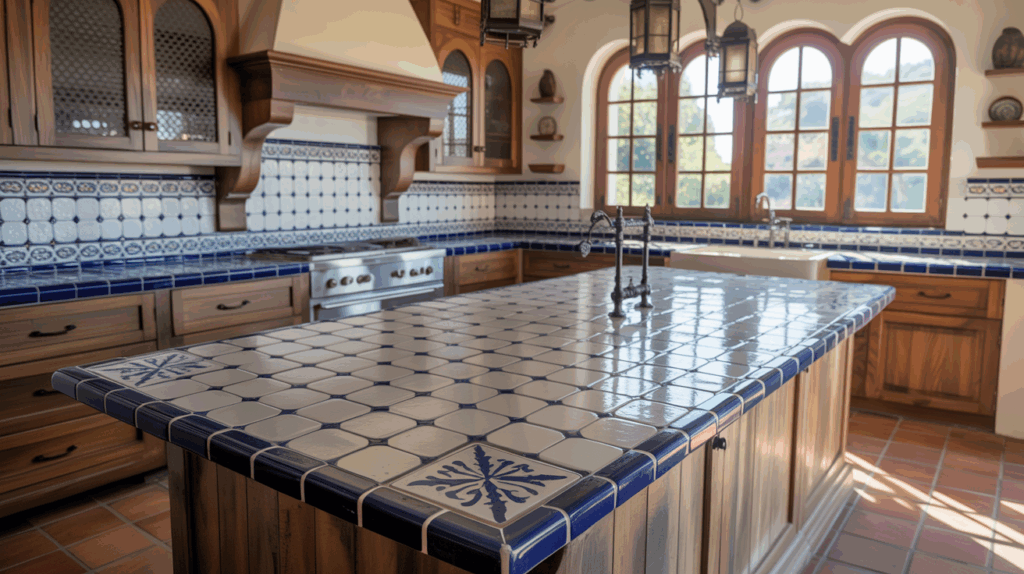
Ceramic tile countertops are composed of individual tiles set in grout, allowing custom designs and easy replacement of damaged tiles. They’re affordable and come in countless colors, shapes, and textures.
- Ideal for: Vintage, eclectic, or colorful kitchens
- Pros: Heat-resistant, easy repairs, DIY-friendly
- Cons: Grout stains easily, uneven surface, not seamless
- Price: $25–$75 per sq. ft.
23. Resin
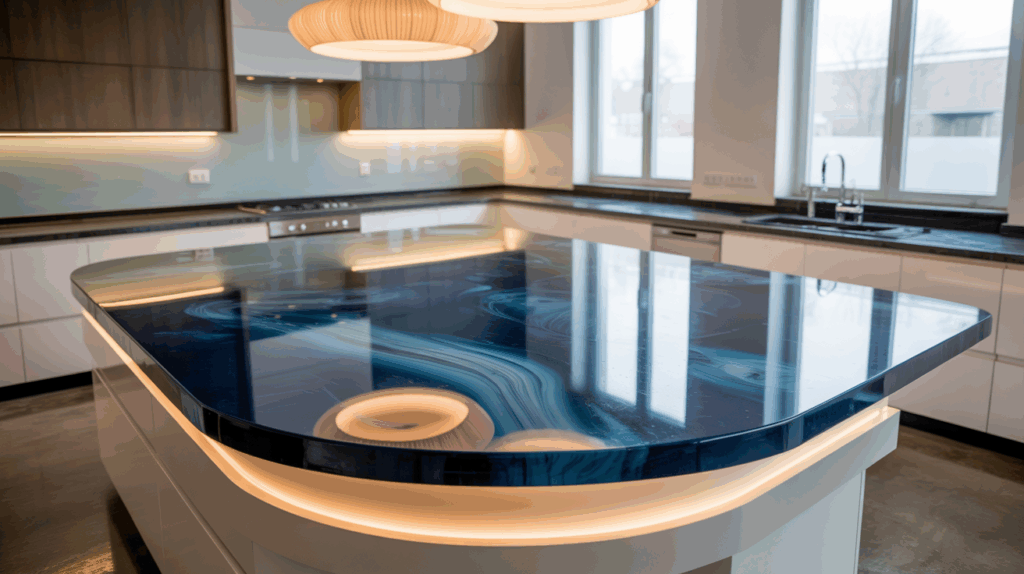
Resin countertops are poured or fabricated from synthetic resins, offering a seamless, non-porous, and colorful finish.
They’re moldable into custom shapes and often used for bold, modern looks.
- Ideal for: Contemporary kitchens, creative custom designs
- Pros: Seamless, stain-resistant, customizable colors
- Cons: Can scratch, not heatproof, limited resale appeal
- Price: $55–$100 per sq. ft.
24. Paper Composite
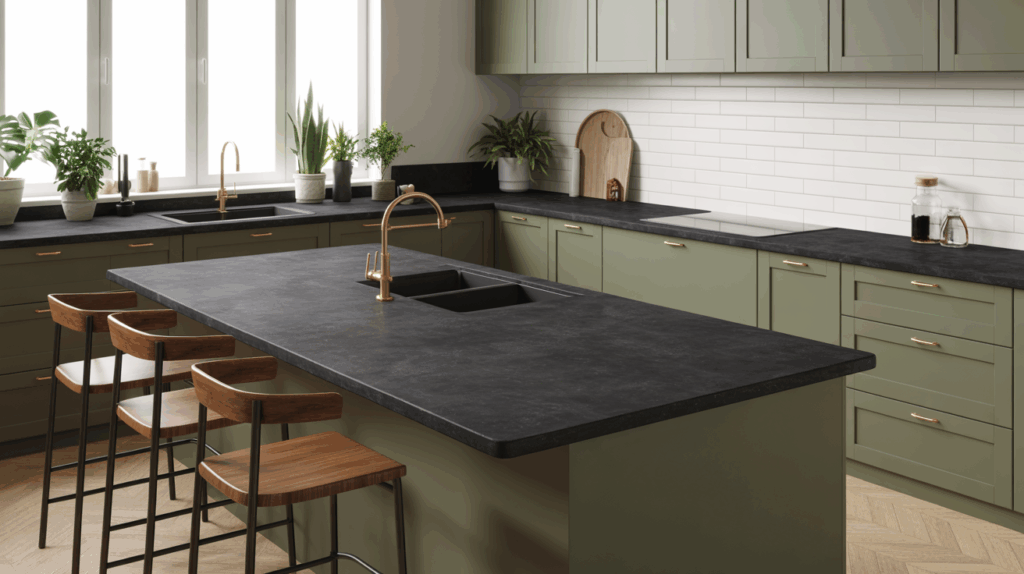
Made from layers of paper and resin, paper composite countertops are sustainable and durable. They resemble stone or soapstone with a soft matte finish and are popular in green home designs.
- Ideal for: Eco-friendly, minimalist kitchens
- Pros: Renewable, warm touch, scratch-resistant
- Cons: Can scorch with heat, needs sealing, limited color options
- Price: $45–$90 per sq. ft.
25. Acrylic
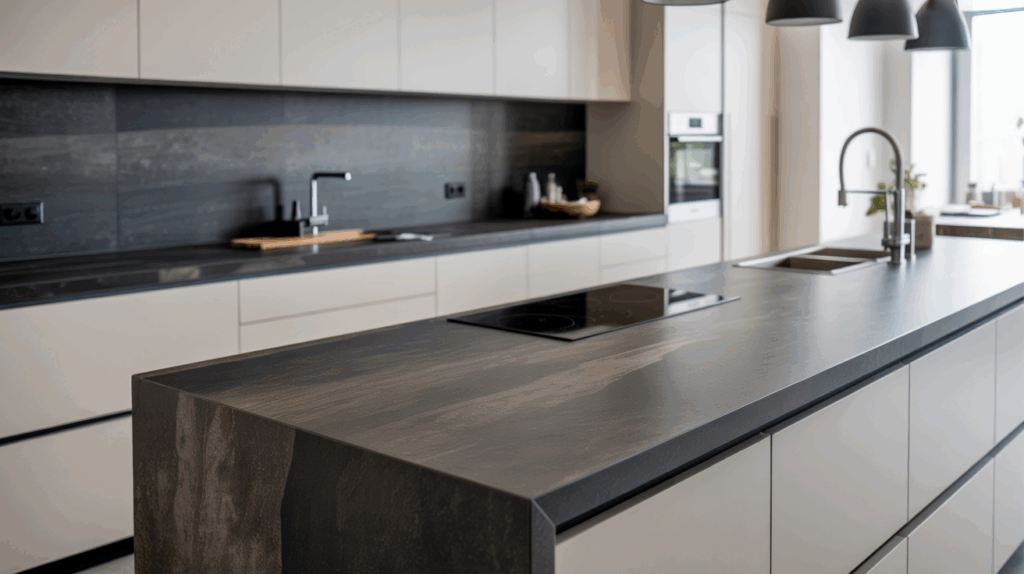
Acrylic countertops are synthetic, solid surfaces similar to resin but more flexible and repairable. They can be seamlessly joined and shaped, ideal for curved or integrated sink designs.
- Ideal for: Sleek, seamless, modern kitchens
- Pros: Non-porous, seamless look, repairable surface
- Cons: Susceptible to scratching and heat damage
- Price: $45–$85 per sq. ft.
26. Lava Stone
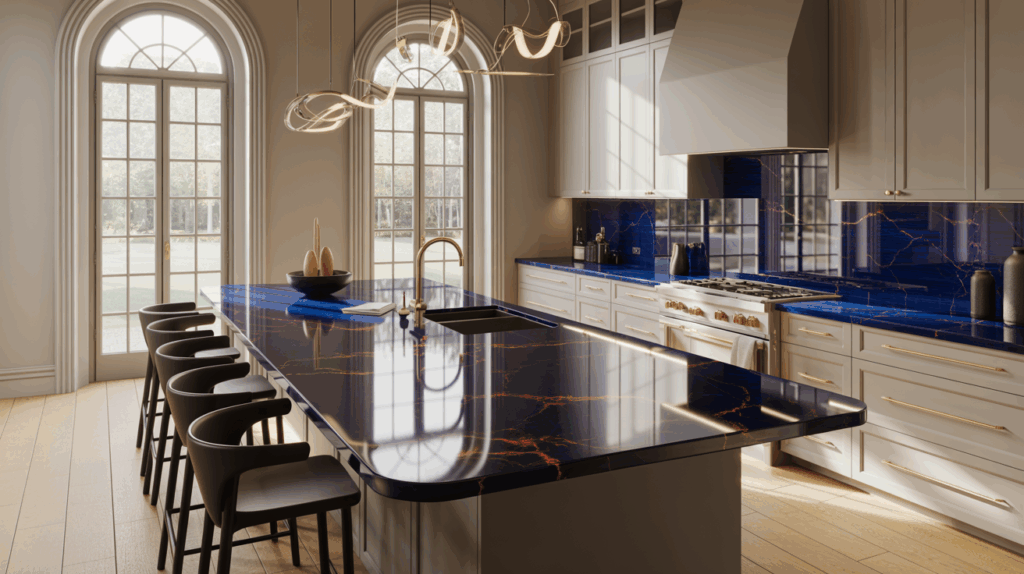
Lava stone countertops are made from volcanic rock coated with enamel and fired at high temperatures. They’re both artistic and practical, offering a glossy, colorful, crack-resistant surface.
- Ideal for: High-end or artistic kitchens
- Pros: Heatproof, non-porous, beautiful glazed finish
- Cons: Very expensive, limited availability, heavy
- Price: $200–$300 per sq. ft.
27. Glass Tile
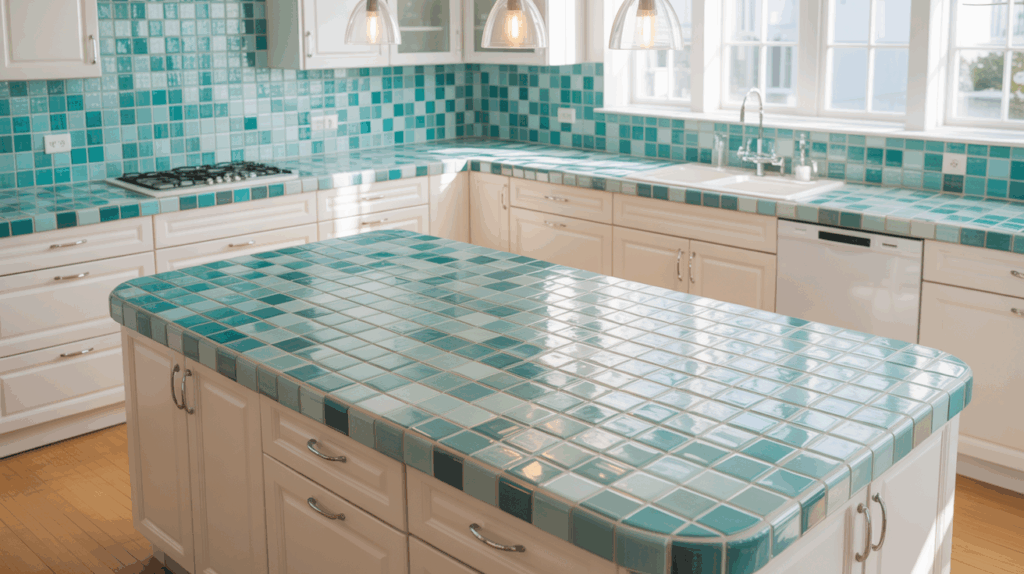
Glass tile countertops feature small, colorful tiles that reflect light beautifully. They’re ideal for backsplashes or accents, though they require careful grout maintenance for lasting appeal.
- Ideal for: Accent islands, artistic or colorful kitchens
- Pros: Reflective and bright, stain-resistant, bold design
- Cons: Grout maintenance, can crack or chip, not seamless
- Price: $50–$90 per sq. ft.
28. Leather-Finish Granite
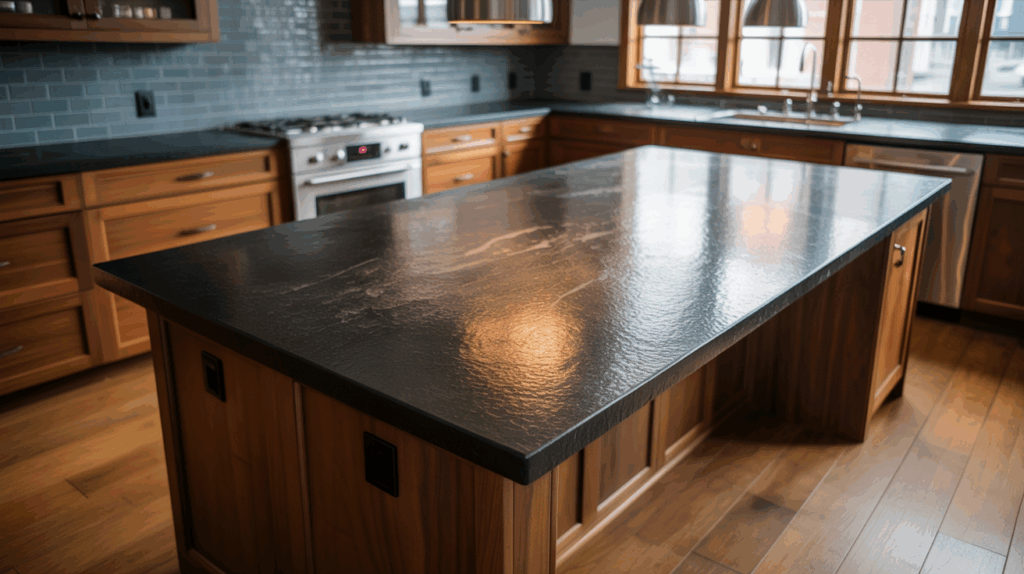
Leather-finish granite offers a textured alternative to polished granite, with a soft sheen and a more organic, tactile feel.
It hides smudges and fingerprints better while retaining granite’s durability.
- Ideal for: Contemporary, rustic, or natural-inspired kitchens
- Pros: Textured surface, hides stains, retains granite strength
- Cons: Fewer color options, more costly than polished granite
- Price: $60–$110 per sq. ft.
29. Travertine
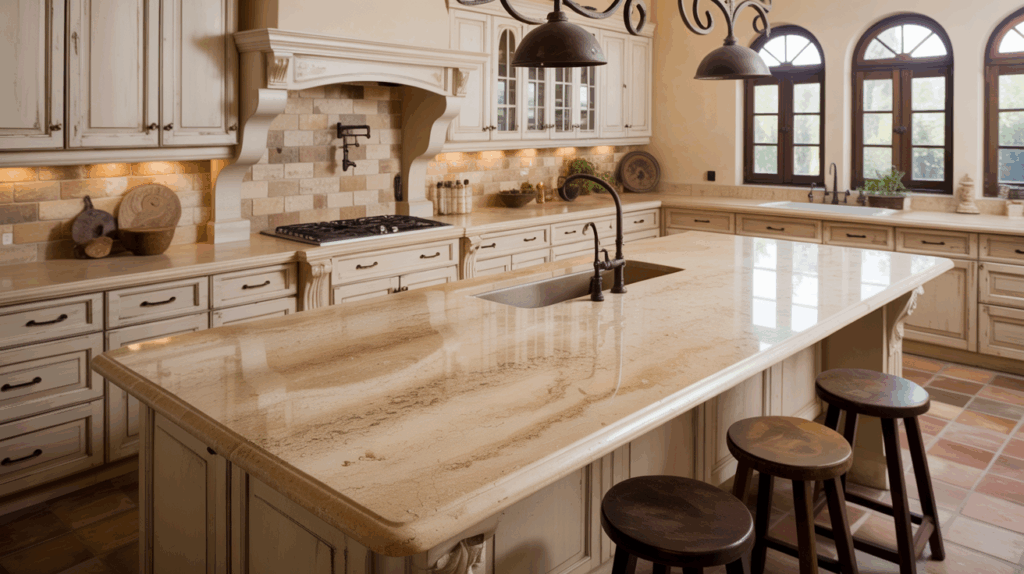
Travertine is a type of limestone with a warm, porous surface and earthy tones. It has a timeless, old-world appeal but requires sealing to prevent stains and etching.
- Ideal for: Mediterranean, traditional, or vintage kitchens
- Pros: Natural elegance, unique veining, soft underlight tones
- Cons: Porous, prone to etching, needs sealing frequently
- Price: $50–$100 per sq. ft.
30. Onyx
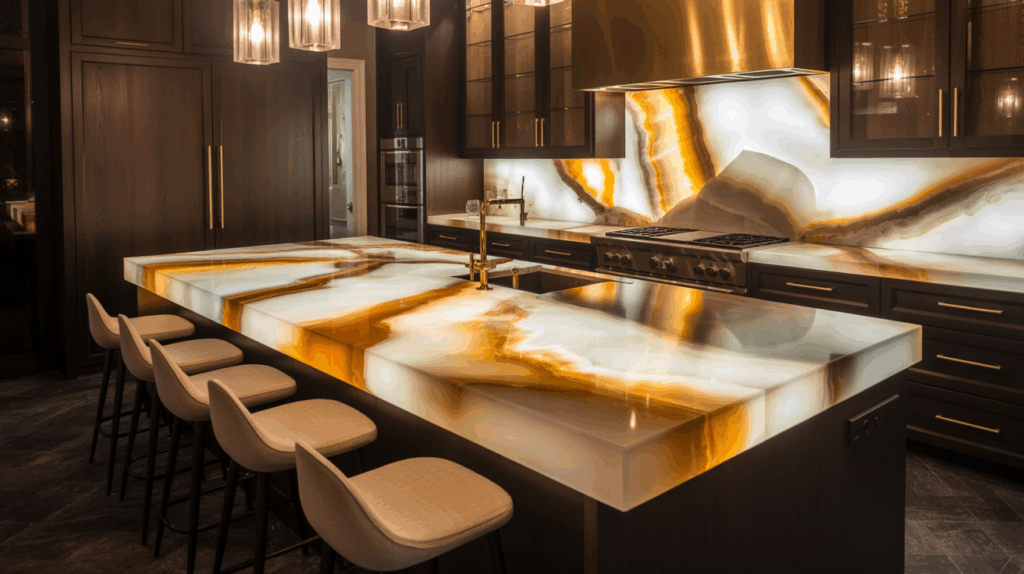
Onyx is a semi-precious stone known for its translucent beauty and dramatic veining. Often backlit, it makes a luxurious design statement but is delicate and best used in low-traffic areas.
- Ideal for: Decorative bars, islands, or showpiece kitchens
- Pros: Striking, translucent, luxurious aesthetic
- Cons: Fragile, scratches and stains easily, high maintenance
- Price: $100–$250 per sq. ft.
31. Nano-Tech Surfaces
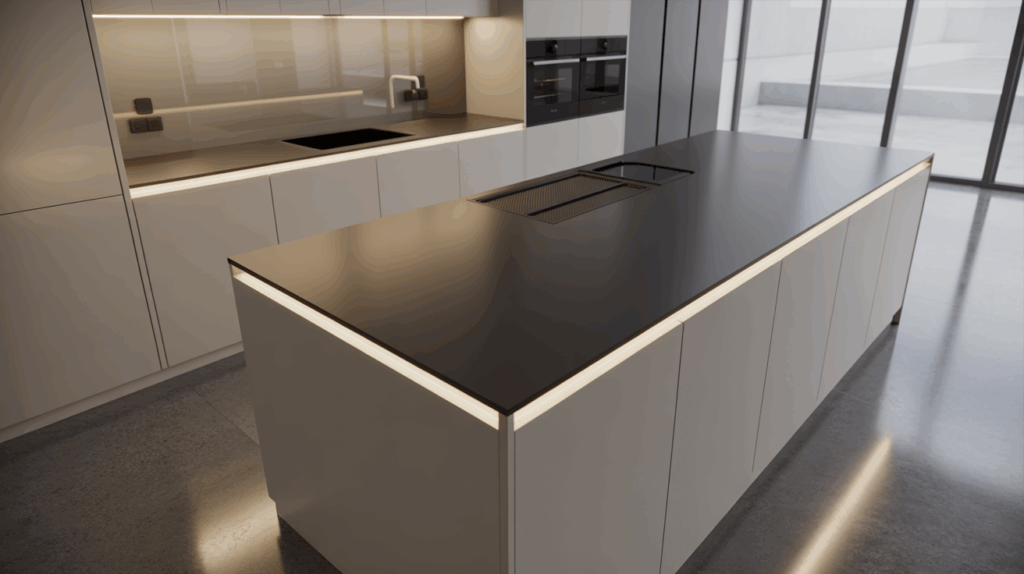
Nano-tech countertops are ultra-modern surfaces amplified at the microscopic level for anti-fingerprint, heat, and impact resistance.
Often matte and sleek, they combine aesthetics with futuristic functionality.
- Ideal for: High-tech, minimalist, or cutting-edge kitchens
- Pros: Anti-fingerprint, scratch-resistant, repairable with heat
- Cons: Expensive, limited availability, mostly matte finishes
- Price: $90–$180 per sq. ft.
How to Pick the Right One for Your Kitchen
Feeling overwhelmed by countertop options? I understand completely. Let me help you pick based on what really matters in your daily life.
Match Your Lifestyle
Busy families need forgiving materials. I’ve watched quartz and solid surface counters handle grape juice spills and crayon marks like champions.
Serious cooks benefit from butcher block for prep work and stone surfaces that can handle hot pans straight from the stove.
Want low maintenance? Laminate or engineered stone won’t demand constant care schedules.
Consider Your Kitchen Style
- Rustic farmhouse: Warm wood counters, weathered soapstone, or honed granite create that timeless look
- Modern minimalist: Sleek quartz or smooth concrete maintains clean, crisp lines
- Traditional kitchens: Classic marble or granite never goes out of style
Your kitchen’s personality and your family’s needs should guide your final decision.
Tips for Getting the Most Out of Your Countertop Investment
After years of watching homeowners make costly mistakes, I’ve learned that choosing the right material is only half the battle.
Smart maintenance and design choices determine whether you’ll love your countertops for decades.
- Match maintenance to your lifestyle: If you won’t seal granite annually, choose quartz. The best countertop is one you’ll maintain properly.
- Mix materials strategically: Use premium stone on the island, budget-friendly options on perimeter counters. Different types of countertops can work together beautifully.
- Seal when water soaks in within 15 minutes: Natural stones need sealing every 6-24 months. Test regularly and don’t skip this step.
- Polish selectively: Some materials need regular polishing, others just soap and water. Over-polishing can damage specific finishes.
- Choose simple edge profiles: Fancy edges cost more and collect grime. Simple edges are timeless and easier to clean.
To Sum Up
Your kitchen countertop isn’t just a surface; it’s where life happens.
I’ve walked you through different types of countertops because the perfect choice varies dramatically from home to home. Maybe you’re gravitating toward low-maintenance quartz, or perhaps that live-edge walnut has stolen your heart.
My advice is to trust your instincts, but verify with your lifestyle. The most beautiful countertop can become a nightmare if it doesn’t match your actual lifestyle.
Take your time, ask the right questions, and remember that the best investment is one you’ll still love in ten years. Your dream kitchen is waiting.
Frequently Asked Questions (FAQs)
1. Can You Paint Countertops?
Typically, you can paint countertops with basic tools, and you can find countertop refinishing kits that come with the materials and application tools you’ll need.
2. What is the Normal Size of a Countertop?
The standard height of 36 inches and depth of 24 to 25.5 inches work well for most kitchens, but it’s important to consider your specific needs and the layout of your space.
3. What is a Good Countertop Thickness?
The standard thickness of a countertop typically ranges from 1.25 inches to 1.5 inches. However, the thickness can vary depending on the requirements and the type of material used.

